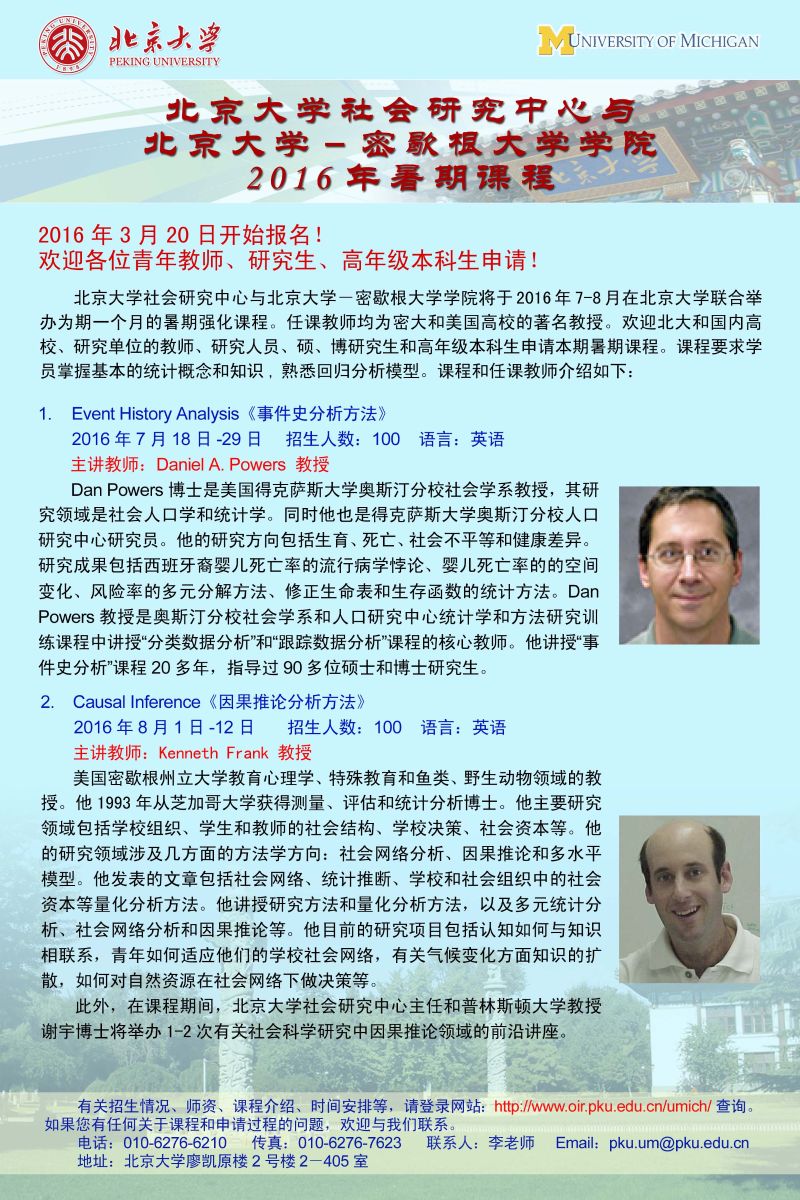鍖椾含澶у绀句細鐮旂┒涓績涓庡寳浜ぇ瀛︼紞瀵嗘瓏鏍瑰ぇ瀛﹀闄㈠皢浜�016骞�鏈�8鏈堝湪鍖椾含澶у鑱斿悎涓惧姙涓烘湡涓�釜鏈堢殑绗�0灞婃殤鏈熷己鍖栬绋嬨�浠昏鏁欏笀鍧囦负瀵嗗ぇ鍜屽寳缇庨珮鏍$殑钁楀悕鏁欐巿銆傛杩庡寳澶у拰鍥藉唴楂樻牎銆佺爺绌跺崟浣嶇殑鏁欏笀銆佺爺绌朵汉鍛樸�纭曘�鍗氱爺绌剁敓鍜岄珮骞寸骇鏈鐢熺敵璇锋湰鏈熸殤鏈熻绋嬨�璇剧▼瑕佹眰瀛﹀憳鎺屾彙鍩烘湰鐨勭粺璁℃蹇靛拰鐭ヨ瘑,鐔熸倝鍥炲綊鍒嗘瀽妯″瀷銆傚叿浣撹绋嬪拰浠昏鏁欏笀浠嬬粛濡備笅锛�/span>
涓��璇剧▼瀹夋帓鍙婁粙缁嶏細
1銆佽绋嬪悕绉帮細Event History Analysis 銆婁簨浠跺彶鍒嗘瀽鏂规硶銆�/strong>
鏃堕棿锛�/strong>2016骞�/strong>7鏈�/strong>18鏃ヨ嚦29鏃�/strong>
璇炬椂锛�/strong>36瀛︽椂 鎷涚敓浜烘暟锛�/strong>100浜�/strong> 宸ヤ綔璇█锛氳嫳璇�/strong>
涓昏鏁欏笀锛�/strong>Daniel A. Powers鏁欐巿
Dan Powers is a professor of sociology in the Department of Sociology at the University of Texas at Austin with interests in social demography and statistics. He is a research associate with the Population Research Center at the University of Texas at Austin where he has participated in funded research over the past 21 years. He has substantive research interests in fertility, mortality, social inequality, and health disparities. His research examines issues relating to the Hispanic epidemiological paradox in infant mortality, temporal change in infant mortality, multivariate decomposition methodology for hazard rates, and statistical methods for adjusting life tables and survivor functions. Dan plays a key role in statistics and methods training in the Department of Sociology and at the Population Research Center by teaching graduate courses in categorical data analysis and longitudinal data analysis. He has taught courses in Event History Analysis in the Department of Sociology for the past 20 years and at the Summer Statistics Institute at the University of Texas at Austin for the past 4 years. He has served on over 90 MS and Ph.D. committees, and is former graduate advisor and GSC chair of the masters in statistics program in the Division of Statistics and Scientific Computation at UT.
缃戝潃锛�/strong>http://www.utexas.edu/cola/depts/sociology/faculty/dpowers
璇剧▼浠嬬粛锛�/span>
The purpose of this course is to introduce and apply methods and models for event history analysis. Event history analysis deals with methods for events occurring in time. This topic is also known as Survival Analysis, and includes the study of methods and models for the analysis of transition rates. This is an applied course that will draw on data from sociology, demography and health fields. The course will provide in-depth treatment of the most widely-used methods for event-history analysis. This course should be useful for graduate students and faculty in the social, behavioral, biological, and health sciences as well as applied researchers in a variety of fields.
Students should have had a course in basic statistics and a course in linear regression and some familiarity with a computer package. The intended audience is graduate students, researchers, and faculty members interested in an overview of event history modeling with the goal of understanding the theory, models, and methods for the analysis of event histories. This course will prepare participants to analyze event history data, and to understand the empirical application of these methodologies in their particular field of study.
2銆佽绋嬪悕绉帮細Causal Inference 銆婂洜鏋滄帹璁哄垎鏋愭柟娉曘�
鏃堕棿锛�/strong>2016骞�/strong>8鏈�/strong>1鏃ヨ嚦12鏃�/strong>
璇炬椂锛�/strong>36瀛︽椂 鎷涚敓浜烘暟锛�/strong>100浜�/strong> 宸ヤ綔璇█锛氳嫳璇�/strong>
涓昏鏁欏笀锛�/strong>Kenneth Frank鏁欐巿
Kenneth Frank received his Ph.D. in measurement, evaluation and statistical analysis from the School of Education at the University of Chicago in 1993. He is currently a professor in Counseling, Educational Psychology and Special Education as well as in Fisheries and Wildlife at Michigan State University. His substantive interests include the study of schools as organizations, social structures of students and teachers and school decision-making, and social capital. His substantive areas are linked to several methodological interests: social network analysis, causal inference and multi-level models. His publications include quantitative methods for representing relations among actors in a social network, robustness indices for inferences, and the effects of social capital in schools and other social contexts. He teaches general introductory courses in research methods and quantitative methods as well as advanced courses in multivariate analysis and seminars in social network analysis and causal inference. Dr. Frank’s current projects include studies of how schools respond to increases in core curricular requirements, cognitive linkages among how aspects of knowledge, how adolescents respond to their social contexts in schools, the diffusion of knowledge about climate change, and how the decisions about natural resource use in small communities are embedded in social contexts.
缃戝潃锛�a href="http://www.msu.edu/~kenfrank/">http://www.msu.edu/~kenfrank/
璇剧▼浠嬬粛锛�/span>
There is currently great debate regarding the basis for causal inferences across the social sciences. Can we make causal inferences only from experiments? What about ethical or logistical limitations, or concerns that the experimental paradigm is artificial because of the necessity for extreme control over conditions? On the other hand, though observational studies are applied to natural conditions, can we rely on statistical control to make causal inferences? What about unmeasured, or unrecognized confounding factors? At what point does a statistical inference sustain a causal inference? Answers to these questions are more than merely academic and philosophical. For example they have immediate implications for policy-making regarding the implementation of innovations.
To address questions such as the above this course will explore causal inference from the perspectives of statistics and philosophy of science. We will begin with a comparison of causal inferences in the social sciences with those of the experimental sciences. Drawing on eclectic readings (Manski, Heckman, Rubin, Holland, Pearl, Shadish, Cook, Campbell Sobel, Dawid), we will use concepts such as the counterfactual, homogeneity of units and internal and external validity to describe causal inference. Furthermore, we will discuss statistical techniques such as propensity score matching and instrumental variables that might be used to improve the likelihood of valid inferences. Finally, we will use recent work to quantify how robust inferences are to potential threats the validity.
In the first half the course I will present methods including regression, propensity score matching, instrumental variables, regression discontinuity, random versus fixed effects, and sensitivity analysis. In the second half of the course we will turn to intensive projects or readings.
琛ュ厖淇℃伅锛�/span>
鍦ㄣ�鍥犳灉鎺ㄨ鍒嗘瀽鏂规硶銆嬭绋嬫湡闂达紝鍖椾含澶у绀句細鐮旂┒涓績涓讳换鍜屾櫘鏋楁柉椤垮ぇ瀛︽暀鎺堣阿瀹囧崥澹皢涓惧姙1-2娆℃湁鍏崇ぞ浼氱瀛︾爺绌朵腑鍥犳灉鎺ㄨ棰嗗煙鐨勫墠娌胯搴с�
浜屻�鐢宠绋嬪簭锛�/strong>
1.鎶ュ悕鏃ユ湡2016骞�鏈�0鏃ワ紞2016骞�鏈�0鏃ャ�璇风櫥褰曠綉鍧�a href="http://www.oir.pku.edu.cn/umich">http://www.oir.pku.edu.cn/umich 鍦ㄧ嚎鎶ュ悕銆�/span>
2. 2016骞�鏈�鏃ユ嫑鐢熷皬缁勫鏍告姤鍚嶆潗鏂欙紝骞堕�鐭ュ鐢熷綍鍙栫粨鏋溿�
3. 瀛︾敓鏀跺埌褰曞彇閫氱煡锛堢數瀛愰偖浠讹級鍚庯紝浜�016骞�鏈�鏃ワ紞25鏃ョ即璐癸紙鍏蜂綋鍔炴硶鍜岃姹傚皢鍦�ldquo;缂磋垂閫氱煡”涓鏄庯級锛屽苟鎵撳嵃淇濈濂界即璐规敹鎹�
4. 鍦ㄥ紑璇炬姤鍒版椂锛屽嚟缂磋垂鏀舵嵁棰嗗彇姝e紡閫氱煡涔﹀拰鍖楀ぇ寮�叿鐨勭エ鎹�璇锋敞鎰忥紝闈炲寳澶у鐢燂細涓ぎ闈炵◣鏀跺叆缁熶竴绁ㄦ嵁锛涘寳澶у鐢燂細涓ぎ琛屾斂浜嬩笟鍗曚綅璧勯噾寰�潵缁撶畻绁ㄦ嵁锛堝寳澶у鐢熺エ鎹姮澶村彧鑳藉啓涓汉濮撳悕锛夈�
涓夈�璇剧▼鍩硅璐�/strong>/璧勬枡璐癸細
闈炲寳澶х睄瀛︾敓锛�,200鍏�浜�姣忛棬璇剧▼銆�鏁欏笀锛�,500鍏�浜�姣忛棬璇剧▼銆�/span>
鍖楀ぇ绫嶅鐢燂細1,000鍏�浜�姣忛棬璇剧▼銆�/span>
娴峰瀛﹀憳锛�,000鍏�浜�姣忛棬璇剧▼銆�/span>
鍥涖�浣滀笟涓庤�璇曪細
璇惧爞璁ㄨ銆佷綔涓氬拰鑰冭瘯鐢变换璇炬暀甯堝畨鎺掋�
浜斻�涓婅鏃堕棿鍜屽湴鐐癸細
涓婅鏃堕棿锛�016骞�鏈�8鏃ワ紞8鏈�2鏃ャ�
涓婅鍦扮偣锛氬寳浜ぇ瀛︼紙涓婅鏁欏鍙﹁閫氱煡锛�/span>
鍏�璇佷功锛�/strong>
1銆佹寮忓綍鍙栫殑瀛︾敓瀛﹀畬瑙勫畾鐨勮鏃讹紝瀹屾垚蹇呴』鐨勪綔涓氾紝閫氳繃鑰冭瘯鍚庡彲鑾峰緱瑙勫畾鐨勫鍒嗗拰鐢卞寳浜ぇ瀛﹀嚭鍏风殑鎴愮哗璇佹槑銆�/span>
2銆佸嚒鍙傚姞鏆戞湡璇剧▼鐨勫鍛橈紝瀹屾垚蹇呴』鐨勪綔涓氾紝閫氳繃鑰冭瘯鍚庡皢鑾峰緱鐢辨巿璇炬暀甯堢鍚嶇殑鍗曠缁撲笟璇佷功
涓冦�瀛︿範鏈熼棿椋熷锛�/strong>
瀛﹂櫌涓嶈礋璐hВ鍐冲鐢熷涔犳湡闂寸殑椋熷闂銆傞瀹裤�鐢熸椿绛夎垂鐢ㄨ嚜鐞嗐�
鍏�鏁欐潗锛�/strong>
鏁欐潗銆佽涔夌瓑璇剧▼鏉愭枡璐圭敤鑷悊銆�/span>
鏈夊叧鎷涚敓鎯呭喌銆佸笀璧勩�璇剧▼浠嬬粛銆佹椂闂村畨鎺掔瓑锛岃鐧诲綍缃戠珯锛�a href="http://www.oir.pku.edu.cn/umich/">http://www.oir.pku.edu.cn/umich/鏌ヨ銆傚鏋滄偍鏈変换浣曞叧浜庤绋嬪拰鐢宠杩囩▼鐨勯棶棰橈紝娆㈣繋涓庢垜浠仈绯汇�
鐢佃瘽锛�10-6276-6210 浼犵湡锛�10-6276-7623 鐢甸偖锛�a href="mailto:pku.um@pku.edu.cn">pku.um@pku.edu.cn
鑱旂郴浜猴細鏉庤�甯�/span>
鍦板潃锛氬寳浜ぇ瀛﹀粬鍑師妤�鍙锋ゼ2锛�05瀹�/span>


